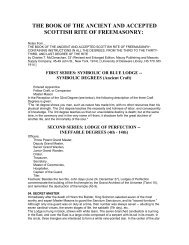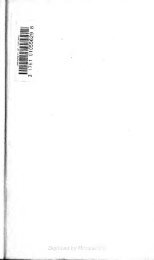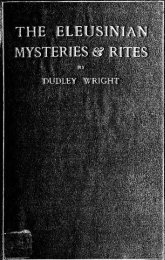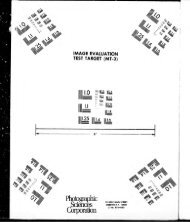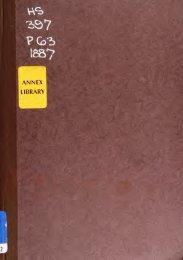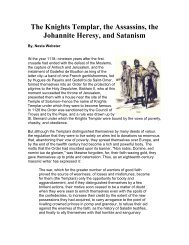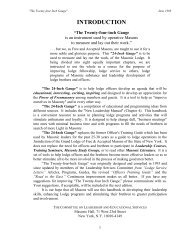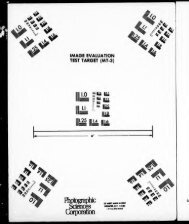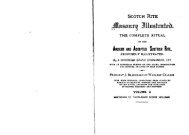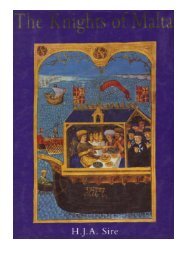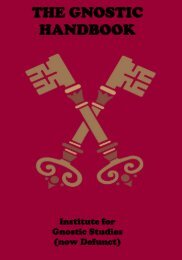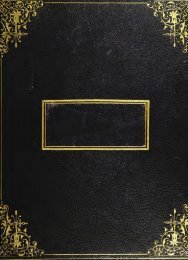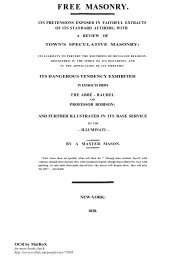The History of Initiation - The Masonic Trowel
The History of Initiation - The Masonic Trowel
The History of Initiation - The Masonic Trowel
You also want an ePaper? Increase the reach of your titles
YUMPU automatically turns print PDFs into web optimized ePapers that Google loves.
Ill<br />
LECTURE VII.<br />
PLACES OF INITIATION INTO THE CELTIC MYSTERIES.<br />
IN attempting to reduce the Celtic Mysteries to order<br />
and regularity, the inquiry will be confined almost,<br />
exclusively to Druidism as practised in Britain, which<br />
contains the essence and perfection <strong>of</strong> the system; for<br />
Cesar informs us that the principles <strong>of</strong> Druidism were<br />
better understood in Britain than in Gaul ; and that it<br />
was customary for the inhabitants <strong>of</strong> the latter country,<br />
who wished for more perfect information on the intricate<br />
subject <strong>of</strong> their mysterious doctrines and practies, to<br />
pass over into Britain, where accurate instruction was<br />
alone to be obtained. 1<br />
<strong>The</strong> name <strong>of</strong> these extraordinary priests 2 has been<br />
variously derived. <strong>The</strong> most commonly received opinion<br />
is, that its origin must be ascribed to the Greek ^QVS, an<br />
oak, because this tree was esteemed peculiarly sacred by<br />
the Druids; 3 and from its spontaneous production <strong>of</strong> the<br />
sacred misletoe, 4<br />
had selected<br />
they believed that the deity<br />
1 Ces. de bel. 1. Gal., vi.,<br />
c. 12.<br />
2 Mr. Reuben Barrow, in the second volume <strong>of</strong> the Asiatic Researches,<br />
(p. 489,) says. "That the Druids <strong>of</strong> Britain were Brahmins<br />
is beyond the least shadow <strong>of</strong> a doubt ; but that they were all murdered<br />
and their sciences lost, is out <strong>of</strong> all bounds <strong>of</strong> probability ; it is<br />
much more likely that they turned schoolmasters, Freemasons, and<br />
fortunetellers, and, in this way, part <strong>of</strong> their sciences might easily<br />
descend to posterity, as we find they have done." With what feeling<br />
towards Masonry Mr. Barrow said this, I have not the means <strong>of</strong><br />
determining, nor does it in the least alter the character <strong>of</strong> his assertion.<br />
I shall consider the opinion as tending to illustrate the anti-<br />
quity <strong>of</strong> the science. <strong>The</strong> Druids were schoolmasters, fortunetellers,<br />
and Freemasons also, though the name was not known in the ages<br />
when they flourished. <strong>The</strong>y certainly did practise a science derived<br />
from Freemasonry, and applied to the same object, the worship<br />
<strong>of</strong> the<br />
deity ; but deteriorated, as all institutions must necessarily be, when<br />
the vital principle is wholly discarded.<br />
3 Plin. Nat. Hist., 1. xvi.. c. 4.<br />
4 <strong>The</strong> misletoe was invested with a character so holy, that it was<br />
accounted a pr<strong>of</strong>anation to touch it with the finger.<br />
<strong>The</strong> ceremonies



